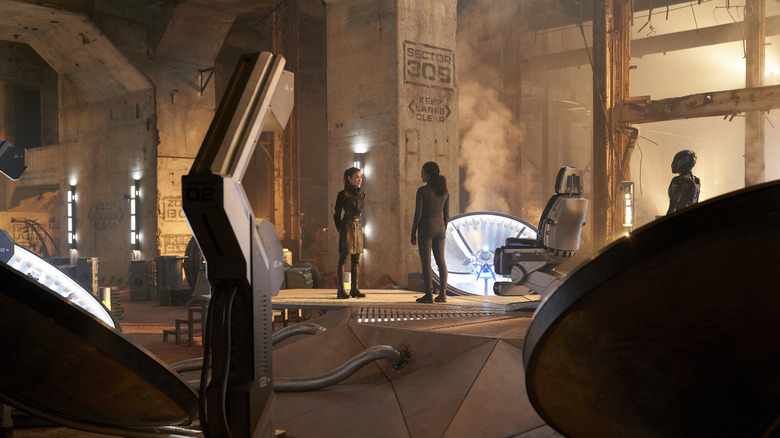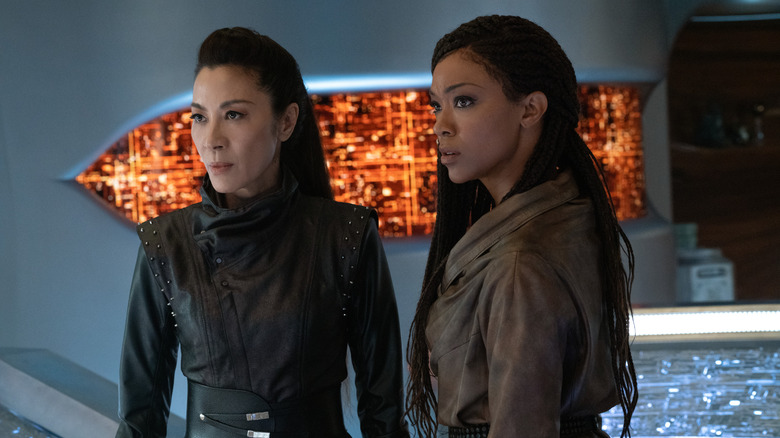How Star Trek's Section 31 Fits Into The Franchise's Timeline
Of all the sticking points in the history of "Star Trek," both on TV and on the big screen, the story of Section 31 seems to hold a special place. In recent months, there has been an incessant buzz over the possibility of a television show has continued more or less unabated, even after purported star Michelle Yeoh — who would ostensibly be reprising her character of Philippa Georgiou from "Discovery" — won her much-vaunted Oscar.
Whenever this show, or something like it, ends up happening, Section 31 has been a controversial addition into the "Star Trek" mythos. It's understandable why. The original series, and much of "The Next Generation," implied a fairly utopian vision of humanity's — and the galaxy's — future. This is, as Captain Picard (Patrick Stewart) says, a society that has transcended money, want, and greed. Starfleet exists mainly for the purpose of exploration rather than conquest. The idea of a deep intelligence organization willing to take actions that arguably fall under the category of war crimes is bound to feel a bit out of place.
That's not to say that Section 31 hasn't provided some truly compelling drama in the "Star Trek" pantheon. Introducing a deadly virus as a weapon against the Changelings in the Dominion War — as they did in Season 6 of "Deep Space Nine" — might have flown in the face of the values of the United Federation of Planets, but it was without a doubt a move that upped the ante on the series drama.
Section 31 was retconned back into the Federation's history
"Deep Space Nine" was essentially the first time viewers had ever heard about Section 31. Neither the original series, "The Next Generation," nor "Voyager" had mentioned it. Created by "DS9" showrunner Ira Steven Behr, it was a deliberate attempt on his part to complicate the utopian aspirations of the United Federation of Planets. But after "DS9," Section 31 was essentially retconned back through Federation history. The intelligence organization shows up in "Star Trek: Enterprise," which, as fans will know, takes place about a century before the events of the original series, before the Federation is founded but when its embryonic forms are coming together. This essentially establishes that Section 31 has been part of the Federation since its inception.
Indeed, Section 31 claims to have been sanctioned through the Federation's charter, which allows for extreme measures to be taken on behalf of the Federation in times of crisis. It also plays a vital role in the most significant event in "Star Trek: Discovery." It is Section 31 who, fearing the Klingons are developing time travel, start to develop their own methods through the Daedalus Project. The initiative includes Gabrielle Burnham (Sonja Sohn), mother of Michael Burnham (Sonequa Martin-Green), whom the latter had thought dead. Gabrielle and her time-traveling Red Angel suit were integral to sending the Discovery 900 years into the future. They've also been revealed to play a role in the third season of "Star Trek: Picard," essentially hoarding the bodies of deceased Starfleet captains to have access to their DNA. Pretty gross.
How did Section 31 get disavowed?
Section 31 was also grafted into the timelines of the original series, "The Next Generation," and "Voyager" through a series of novels released in 2001. There is a question that lingers about Section 31, at least in televised "Star Trek." That is how exactly it goes from an organization ostensibly sanctioned by the Federation into what is essentially a rogue organization. During "Enterprise" and "Discovery," Section 31 is viewed as a controversial outfit but still ostensibly within the orbit and administrative grasp of the Federation. By the time of "Deep Space 9," it is very much viewed as a danger. While it claims to be working on behalf of the Federation and in the name of its protection, few outside of its members are aware of its existence.
Will the Section 31 series chronicle this downfall? One possible clue is that, according to what scant information we do have, the Philippa Georgiou featured in the upcoming show will be the more ruthless, imperial Terran version from the Mirror Universe, who was brought back across the interdimensional rift to join Burnham and the crew of the Discovery. Though this Mirror Georgiou does come to identify with the Federation and Starfleet to some extent, she never really relinquishes her amorality or her downright cruelty. Whether this plays a role in the Federation's official disavowal of Section 31 is certainly possible. However, we simply will not know until it moves out of its current state of dormancy.


